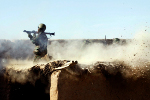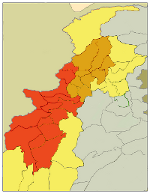Mullah Baradar, the Afghan Taliban's deputy commander, reported captured in Karachi
Pakistan's top military intelligence service has captured the Afghan Taliban's deputy commander during a raid in the port city of Karachi.
The Inter-Services Intelligence agency, Pakistan's military intelligence service, accompanied by officers from the US Central Intelligence Agency arrested Mullah Abdul Ghani Baradar, the Afghan Taliban's second in command and the group's operational commander, several days ago, US officials told The New York Times.
Baradar has been a longtime leader in the Afghan Taliban and a close confidant of Mullah Mohammad Omar, the spiritual leader of the group. He is said to direct the Taliban's Shura Majlis, or top leadership council. Baradar directed the Taliban's day-to-day operations, and is in close contact with regional military commanders and the shadow governors. He also is said to control the Taliban's purse strings.
The exact date of Baradar's arrest was not given; it is not known if Baradar's arrest has led to the capture of other senior Taliban leaders. As operational commander, Baradar will have extensive information on the Taliban's strategy and its leadership cadre.
The Taliban have denied Baradar has been captured and claimed he is still in Afghanistan.
"He has not been captured," Taliban spokesman Zabihullah Mujahid told Reuters. "They want to spread this rumour just to divert the attention of people from their defeats in Marja and confuse the public," he continued, referring to the ongoing Coalition and Afghan offensive in central Helmand province.
The Taliban routinely deny that their leaders are operating from inside Pakistan and claim they are capable of operating from within Afghanistan, as they control much of the countryside. But several senior Taliban commanders have been detained in Pakistan.
Baradar is the most senior Afghan Taliban leader to have been detained in Pakistan since the US invaded Afghanistan in late 2001. Other Taliban leaders captured in Pakistan include Mullah Obaidullah, Mansour Dadullah, and Anwarul Haq Mujahid.
Obaidullah served as the Taliban’s defense minister before he was detained during a raid in Quetta in February 2008 as he was raising money for operations in Afghanistan. Dadullah was the former Taliban commander of southern Afghanistan who was dismissed by Mullah Omar in early 2008; he was captured by Pakistani security forces during a raid on a religious seminary in Baluchistan. Mujahid was the commander of the Tora Bora Military Front and was detained during a raid in Peshawar in 2009.
The Afghan Taliban's leadership cadre have long operated from within Pakistan. The Taliban's leadership council, called the Quetta Shura, has operated from the Pakistani city of the same name for years, according to Afghan and US officials.
Last fall, the Quetta Shura, and Mullah Omar himself, were reported to have been relocated to Karachi.
Baradar's arrest, if confirmed, creates problems for the Pakistani government. Numerous Pakistani government, military, and intelligence officials have repeatedly denied the existence of the Quetta Shura and have disputed claims that it had moved to Karachi.
But Baradar's arrest in Karachi would provide the strongest evidence that the Quetta Shura is now in the Pakistani port city.
The Inter-Services Intelligence agency has long been accused of sheltering the Quetta Shura, as it views the Afghan Taliban as its greatest asset in regaining influence in Afghanistan. The terror group would also serve as strategic depth, or a reserve, against India and Indian influence inside Afghanistan.
General Ashfaq Kayani, the top military leader in Pakistan, refuted claims that Pakistan supports the Taliban for influence in Afghanistan. In an interview with foreign reporters, Kayani said that Pakistan merely wants to train the Afghan military.
"We want to have strategic depth in Afghanistan, but that does not imply controlling it," Kayani said, The Washington Post reported. "If we have a peaceful, stable and friendly Afghanistan, automatically we will have our strategic depth because our western border will be secure, and we will not be looking at two fronts."
The Pakistani military has refused to take on the Haqqani Network, a dangerous Taliban group allied with al Qaeda and based in North Waziristan, and other Taliban leaders who support the fight in Afghanistan. The military has ruled out an operation in North Waziristan over the next year.


